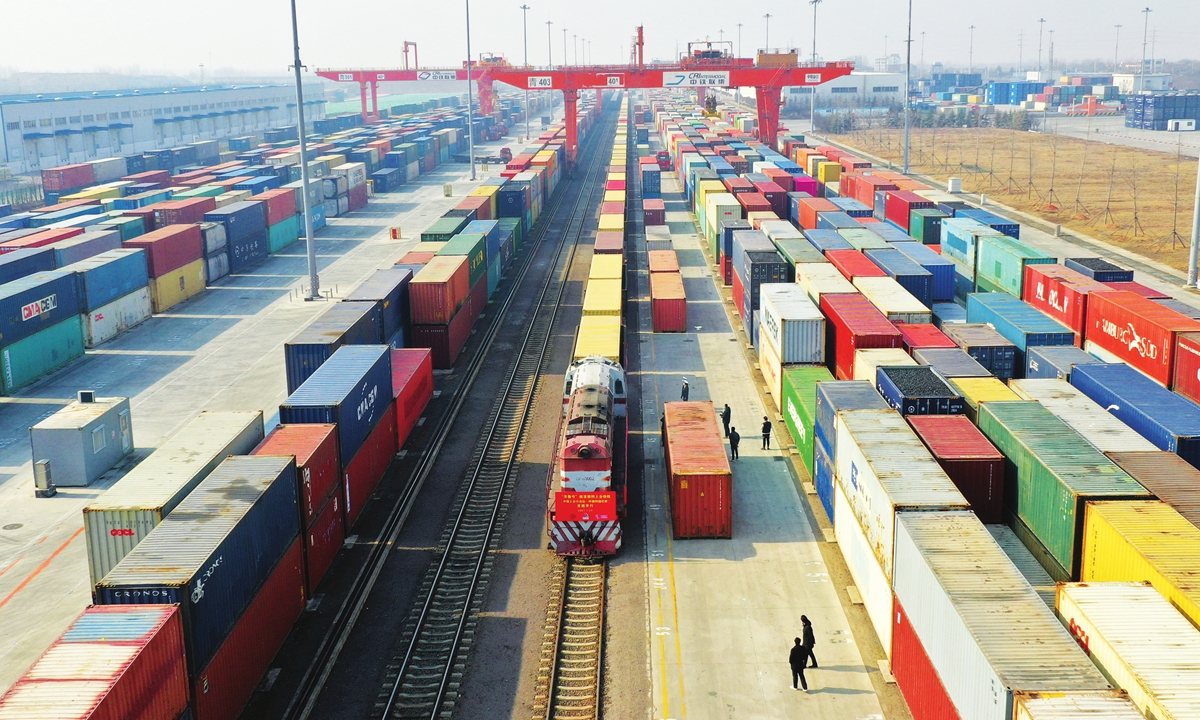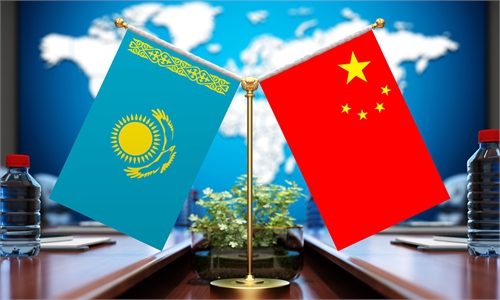Trans-Caspian international transportation route opens to enhance Central Asia's role as a key hub between East and West

A freight train bound for Azerbaijan leaves the multimodal transport center in the China-Shanghai Cooperation Organisation local economic and trade cooperation demonstration zone in Qingdao, East China's Shandong Province, on January 31, 2021. Photo: cnsphoto
Heads of state from China and Kazakhstan on Wednesday jointly attended an opening ceremony of the Trans-Caspian international transportation route via video link, China Media Group reported on Wednesday.
The opening of the route marks the first time that Chinese freight vehicles can reach the ports along the Caspian Sea coast through direct road transport and the completion of a multi-dimensional interconnected transportation network that integrates road, rail, air and pipeline transport.
The development of the transportation route is expected to facilitate construction of Trans-Caspian international transportation corridor and help the economic development of Central Asia as an important hub between the East and West, experts said.
At the Third Belt and Road Forum for International Cooperation held in Beijing in October 2023, China announced plans to participate in the construction of the Trans-Caspian international transportation corridor, and collaborate on a new logistics corridor across the Eurasian continent linked by direct railway and road transportation.
The new logistic corridor via the Caspian Sea is a key route for the operation of China-Europe freight trains and holds great importance to ensure the efficiency and security of the cargo transport against the backdrop of the Russia-Ukraine conflict and Red Sea crisis, Li Xin, director of the Center for Russian and Central Asia Studies at the Shanghai Institutes for International Studies, told the Global Times on Wednesday.
It will provide more options for China-Europe freight trains, lower transportation fees and expand the volume of goods being transported, Li said.
It will also provide an opportunity to expand the role of Kazakhstan and some landlocked countries in Central Asia as a transportation hub for the Eurasian continent, increasing the potential for transit transport and driving local economic development, Li added.
In the latest development, China-Europe freight train X9043 departed from Xi'an, Northwest China's Shaanxi Province on Monday, with a full load of daily necessities, automobiles and accessories.
Starting from Monday, the train will run daily, with a total transportation time of approximately 12 days, passing through Kazakhstan, crossing the Caspian Sea, and arriving in Baku, Azerbaijan, according to China Railway.
This regular operation of the China-Europe freight train across the Caspian Sea will expand the network for the China-Europe freight train, providing more options for domestic and international customers in foreign trade transportation. It will also inject new impetus into promoting economic and trade exchanges between China, Europe and countries along the route, and serve the high-quality construction of the Belt and Road Initiative, China Railway said.
The number of China-Europe freight trains and China-Asia freight trains crossing the Caspian Sea has increased by more than 10 times year-on-year, with stable daily operations since May, officials from the National Development and Reform Commission (NDRC) said on June 26.
The NDRC will work with relevant departments to improve infrastructure, simplify customs procedures, reduce transportation costs and provide high-quality transportation services, the NDRC said.

